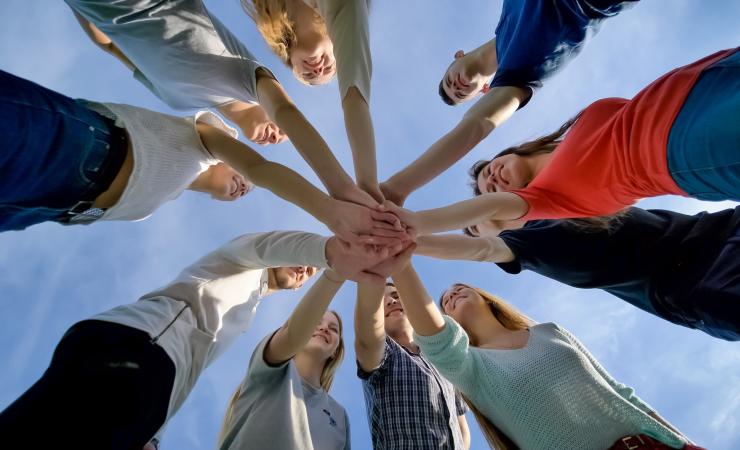Universal Fraternity Can Change the World.

At last year’s World Youth Day in Lisbon, more than a million young people shared among themselves social friendship. Pope Francis calls this universal fraternity, proving a new fraternal order and world social experience possible.
Universal fraternity refers to the unity and solidarity amongst all human beings, regardless of their differences. It is a vision aiming at the search for peace, harmony, and cooperation between everyone, valuing equality, compassion, and mutual respect.
This universal fraternity lies upon the premise that all human beings are part of the same global family, which shares a fundamental unity. Ubuntu is an African concept rooted in the philosophy and traditions
of the Bantu cultures and peoples exemplifying well what
social fraternity is all about.
Ubuntu can be translated as “I am because we are.” This philosophy emphasizes the link between people and underscores the importance of social relationships, empathy, and solidarity.
This vision of social fraternity transcends geographic and political barriers, trying to promote a conscience of our interdependence and our responsibility toward each other.
In practice, universal fraternity manifests itself in initiatives of humanitarian aid, social projects, and intercultural and interreligious dialogue, besides the efforts to promote education, rights equality, and social justice in all its forms.
Universal fraternity is a call to recognize our unity and interdependence as human beings and, as such, advocates for joint work for the wellbeing of everyone based on the values of love, compassion, and respect, values that are rooted in the Gospels of Jesus Christ.
There are attitudes and behaviours in each one of us that can hamper the promotion of social fraternity. We highlight a few of them. Prejudice and discrimination: prejudice based on race, religion, genre, sexual orientation, or any other personal characteristic is detrimental to social and universal fraternity.
Discrimination marginalizes certain groups and impedes the construction of equal relationships. Intolerance and hatred: absence of tolerance towards opinions, beliefs, and identities of others, as well as hatred and hostility, are barriers against social fraternity.
Social inequality: the existence of economic inequality of opportunities and access to essential resources, such as education and health, undermines social fraternity.
Extreme individualism: excessive individualism that puts personal interests above collective interests can hinder social fraternity. Absence of dialogue and listening: the lack of constructive communication, and the refusal to listen to different perspectives may hinder social fraternity.
Violence: physical violence, verbal or emotional, creates divisions and hampers social fraternity. Particularly, nowadays we witness persecution through social media or cyberbullying. Doubtless, it is important to be aware of these obstacles and work to overcome them, promoting equality, respect, and mutual understanding.
To promote social friendship, there exist various actions we can implement. Cultivate empathy: try to understand the experience and perspectives of others, placing ourselves ‘in their shoes.’ This helps to create an emotional relationship as well as to promote mutual understanding. Being inclusive: involve people of different origins and cultures in your activities and conversations.
Promote the culture of encounter, without excluding anyone. Promote diversity and give room to all voices. Be open to dialogue: let us encourage respectful and constructive conversations, even when there are differences of opinion. Let us approach each other, let us listen and know others, try hard to achieve mutual understanding, and search for moments of encounter and dialogue.
Participate in community activities: involve ourselves in projects and events that gather people of the community. As such, we shall have the opportunity to get to know new people and establish friendships. Promote equality and social justice: pay attention to the questions of inequality and injustice in society.
Participate in campaigns in favour of the most vulnerable people. Open our eyes to see the wounds of many brothers and sisters deprived of dignity. Contribute to creating a more just society, where all enjoy equal opportunities and are treated with dignity. Be gentle and generous: practice acts of goodness in our everyday life. Recognize human dignity always and in any circumstance.
Small gestures, like smiling, offering aid, or being polite with others, can make a big difference in the building of friendly relationships. Positively use the social media platforms: use the online platforms to share messages of encouragement, gratitude and support. Do not disseminate hatred, prejudice, or discord. Use social media as a tool to build bridges between people. The youth are the best prepared to restart anew.
At last year’s World Youth Day in Lisbon, thousands of young people from different cultures, languages, and social and religious traditions showed to the whole world that the way to the construction of a more sustainable society, more welcoming, and fraternal is possible: to live and cultivate the social friendship based on the actions of the day-to-day life. (Photo: 123rf)
Filipe Resende



